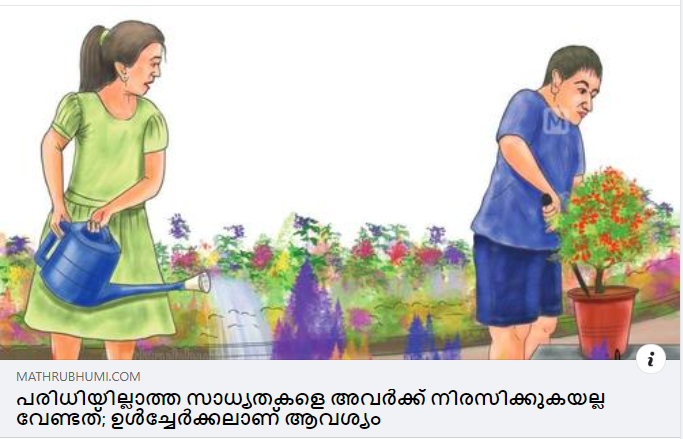
Subject: Request for Appointment to Discuss a Lifespan Approach to Disability Dear Prof. Bindu R, I hope this message finds you well. I am writing on behalf of Together We Can, an advocacy forum that focuses on issues related to mental health, disability, education, child and human rights. I want to express my gratitude for your involvement in the recent Mathrubhumi media campaign "Idam Nalkam Makkalk, Ammayk Jeevithavum." In light of the responses to this campaign, we believe it's crucial to emphasize the need for a lifespan approach to disability. Our forum strongly believes that creating establishments that segregate individuals based on their abilities or disabilities is counterproductive to the essence of inclusion. Such an approach not only violates the mandates within the RPwD 2016 but also contradicts the extensive research and years of active lobbying that went into creating laws safeguarding the rights of disabled individuals and their families. While we acknowledge the valid concerns raised by families of persons with disabilities regarding the question "What after us," we must consider the broader context. Many families living in poverty and unable to support their adult disabled children face not just a disability-related issue but also the larger problem of poverty and lack of social security. This highlights how the support systems before the child turned 18 have often failed. We would like to bring to your attention the context in which this situation has arisen. In the attached Mathrubhumi campaign article, we discuss the importance of a lifespan approach to disability. We have been actively engaged in advocacy work, and our PIL (15436/2017) and the court verdict of 2020 underscore the urgency of constituting district-level committees as stipulated by law. These committees, recommended by KeSCPCR in 2016, are essential to understand and provide local support to persons with disabilities. However, the formation of these committees is still pending. We believe your intervention in this matter could expedite the process. We urge for the implementation of projects that revamp the current system and promote coordination among various departments, such as health, education, and social justice, to address disability from a lifespan perspective. These projects should begin from the time of childbirth, including diagnosis, therapies, schooling, vocational training, and living within communities interdependently. Inclusion should not be confined to government or aided establishments but should also extend to private and non-governmental organizations. For reference, we have attached a similar action taken in Tamil Nadu, where a petition was filed based on a news article highlighting a district collector's proposal for an exclusive township for persons with disabilities. We support the sentiments expressed in this petition and request our government to consider a similar approach. It is evident that the education system and inclusive education programs in schools, including special schools (private, aided, and government), require significant change. The lack of training among mainstream school teachers and stringent admission criteria within private schools have led to the exclusion of children with diverse learning skills from mainstream education. The unregulated private sector schools and therapy centers are also subject to the same laws of the country, but the absence of monitoring has allowed abuse and misuse of the law to go unchecked until serious incidents occur. To create lasting change, we must address the root causes. We propose starting with disseminating knowledge about laws, rights, and duties of stakeholders, equipping families to access the right support systems from the moment a child is born and well before they turn 18. To truly empower communities, we must address these issues locally by learning from both the facilitators and barriers within each locality. Inclusion is a two-way process, just as learning is. Segregating people based on their abilities or disabilities and defining them solely by these characteristics dismisses the limitless possibilities within a community that thrives on interdependence. As a founding member of Together We Can, I write with conviction, drawing not only from my two decades of work in the field but also from rigorous scientific research on understanding the journey of mothers of children with autism in India, with a predominant focus on Kerala. We have attached my thesis, which outlines detailed pathways for a necessary paradigm shift in how we view disability and rehabilitation, particularly in Chapter 9. As a first step, we kindly request an appointment to meet with you, where we can present and explain a detailed pathway for change. We trust in your expertise and able leadership to guide our state in creating safe and secure spaces for all to coexist with dignity. Thank you for your continued support. Yours sincerely, Seema